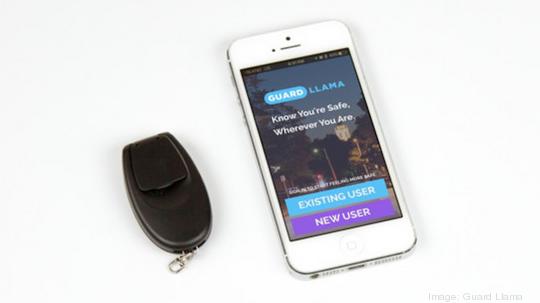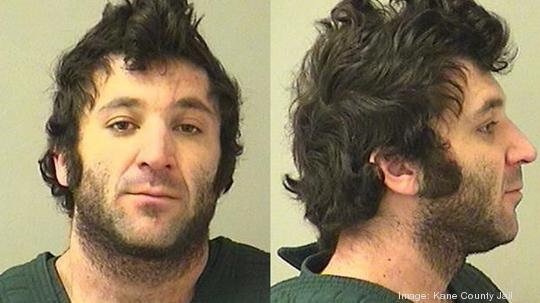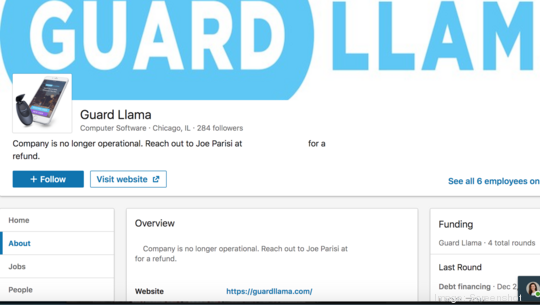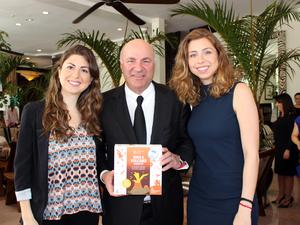In 2017, Joseph Parisi stood on the famed "Shark Tank" stage to pitch his personal safety startup Guard Llama to Mark Cuban, Barbara Corcoran, Kevin O’Leary and the rest of the celebrity investors on the hit ABC show.
To punctuate the company’s product — a key fob-like device that calls the police in an emergency — a real, live llama was brought out for effect. But in the middle of the pitch, the llama defecated on the floor.
“How do you think your pitch is going?” O’Leary quipped.
That national TV embarrassment quickly became the least of Guard Llama’s — and Parisi’s — problems as complaints began to pile up against the startup with D.C. ties in the years following its "Shark Tank" appearance.
Customers now allege that Guard Llama — which had formerly claimed D.C. and Chicago as its headquarters — was charging their credit cards even though they made efforts to cancel the service. Others complained that they were paying for a service they were no longer receiving. In some instances, customers reported that they tried to use the Guard Llama device to call authorities and that the call never went through.
The complaints against the safety startup came amid Parisi’s own trouble with the law. In late 2019, he was charged with drug trafficking after federal agents said they intercepted $80,000 worth of ecstasy and other drugs that were allegedly shipped to Parisi from the Netherlands.
Parisi has not answered multiple interview requests in the last year about Guard Llama’s operations, customer complaints or his legal case.
Founded in 2015, Guard Llama began as a promising local startup, raising funding, hiring employees and sharing its ambitious plans for the future. At one point, Guard Llama had as many as 2,000 users.
Today, despite having an active website, some former customers describe Guard Llama as unresponsive to users, and the Better Business Bureau said it believes the company is no longer operating.
Guard Llama complaints
Founded by Parisi, Nicholas Parga-Nevarez and Adam Havey, Guard Llama’s device was designed to easily and quickly contact authorities in an emergency for an annual subscription of $179.99. Parga-Nevarez said he left Guard Llama in 2017. Havey departed in 2018, and since then, Parisi has led the startup, largely from Chicago.
Guard Llama's device allowed people in emergency situations to send a distress signal to police by two taps of a button on the handheld device. The device worked in conjunction with a mobile app, and if the button was pressed twice, it would send a user's profile and location to Guard Llama dispatchers. To help prevent false alarms, Guard Llama dispatchers verified the claim before contacting police by sending a confirmation message to the user's phone. Once confirmed, the user's identity and location were sent to the police.
Trouble began plaguing Guard Llama in 2018, when customers started filing complaints with the Better Business Bureau, alleging that the device wasn't working and that they were unable to terminate subscriptions. In interviews with Inno, former customers corroborated complaints with similar stories of their own.
“I don’t know what happened, but it became evident and apparent that they weren’t responding. You would hit the button and no one was responding,” said Julianne Jaensson, a former Guard Llama customer and regional manager at Carpenter Realtors in Indianapolis.

Jaensson began using Guard Llama’s services in 2016 after the startup pitched its device to her firm as a useful safety tool for real estate agents as they travel from house to house showing people properties.
“They actually came into several of our offices and presented,” Jaensson said. “It seemed like a great product. Working with real estate agents, safety is always an issue.”
Soon after being introduced to Guard Llama, Jaensson said she and several of her colleagues began using the service.
“We tried it and it worked,” Jaensson said. “It was actually positive all the way through, until it wasn’t.”
A couple years later, in 2018, she said Carpenter agents began sensing that their devices weren’t doing what they promised. Jaensson said agents would press the button to contact dispatchers, but no one ever responded. At that point, she said, Carpenter agents tried to end subscriptions but for months were unable to reach a Guard Llama representative by phone.
On Guard Llama's website, the company's terms and conditions page says users can cancel anytime over the phone, with the caveat: "You will may [sic] be charged for any future months or years depending on your plan."
Eventually, some Carpenter agents were able to terminate subscriptions via email but Guard Llama refused to give refunds for subscription dues already paid, even though agents had been trying to end subscriptions for some time, Jaensson said. Any refunds they received came directly from their bank after being reported as a disputed charge, she said.
Jaensson said Guard Llama was still charging some Carpenter agents up until September 2019. Recurring charges at that time were about $90 per year.
“I don’t know what happened,” Jaensson said. “I don’t know where they are.”
Parisi’s arrest
On a Friday morning in December, Parisi logged onto a Zoom call with his attorney to schedule a hearing in Kane County's Sixteenth Judicial Court for the drug charges that were brought against him a little over a year ago.
Amid the two years of ongoing complaints about Guard Llama to the BBB, Parisi was charged in November 2019 with drug trafficking and possessing more than $80,000 worth of drugs after a search warrant and sting operation was executed at his home, according to police records from the Kane County Sheriff's Office in St. Charles, Illinois.
Parisi’s lawyer, David Camic, an attorney at Chicago-based Camic Johnson Ltd., said in an email to Inno that Parisi has pleaded not guilty to the charges brought against him and that the “case has nothing to do with his business.”
The police warrant in 2019 was the result of a two-week investigation that began when Department of Homeland Security investigators intercepted multiple packages of suspected ecstasy that were being shipped from the Netherlands to Parisi’s home in suburban Geneva, Illinois, according to police records. In one of the packages, the drugs were hidden inside candle wax, records show.

In the sting operation facilitated by DHS and United States Postal Inspectors, police records show that authorities intercepted a box containing 120 grams of ecstasy, repackaged it with a tripwire and sent it to Parisi’s home. When opened, the wire notified authorities that the box was opened, and it included a purple staining substance that reacts with hand moisture.
When deputies executed the search warrant Nov. 20, 2019, they surrounded Parisi’s home, at which point he fled from the rear door into the backyard, police records show. Authorities said they recovered the ecstasy package from the woods behind Parisi’s home, where he allegedly threw it when they arrived. At the time of the search, Parisi’s hands were purple, signaling he had been the one to open the package, according to police records.
During the search, authorities also found about 65 grams of cannabis in the garage, a small amount of cocaine and 7 grams worth of mushroom plants in the basement, records show. Police also found a notebook containing “directions on how to grow and manufacture ‘magic’ mushrooms,” according to the police report.
Once Parisi was in custody, deputies took him to Kane County Jail. A week later, he posted his $80,000 bail and was released. He is next due to appear in court on Feb. 17, Camic confirmed.
‘A lot of angry people’
In July, Guard Llama posted a message to its LinkedIn page that said the company was officially no longer operating and was asking former customers to get in touch with Parisi for refunds.
But after an inquiry to Parisi from Inno at that time about the notice, Parisi claimed the startup was still operating and the message was taken down. Guard Llama's website is still online but the most recent blog post is from March 2019. Parisi did not respond to further questioning from Inno about Guard Llama's status or the BBB complaints the company has received in the last three years.

Havey, one of the Guard Llama co-founders who left the company in 2018, declined to be interviewed for this story.
The third co-founder from D.C., Parga-Nevarez, didn't return multiple requests for comment over several months for this story. After publication, he sent a statement to Inno saying that his association with Guard Llama was only to be on its "Shark Tank" episode, and that ended "a few months after the show aired when he realized he too was being used only to get on the show." "He's sorry he ever met Joe Parisi and ever being associated with Guard Llama," his statement read.
Today, there are more than 50 complaints and negative reviews against Guard Llama filed with the BBB, with the most recent one posted Dec. 1. Recent complaints have been designated with the status: “BBB unable to locate business," and Guard Llama's BBB profile has a message that reads: "It appears that this business is no longer in business."
“I knew they were probably shut down when nobody is calling you back and they’re trying to charge you,” said former customer Michelle Campbell. “There’s a lot of angry people.”
Campbell, a practicing real estate agent with Coldwell Banker in Brookfield, Wisconsin, began using Guard Llama in 2017 for similar reasons as Jaensson. Campbell paid for the Guard Llama service for about two years, but once she decided she didn’t need it anymore, she was, similarly to Jaensson and other customers, unable to terminate the service.
“After a couple years, I didn’t want it anymore,” Campbell said. “I didn’t feel like I was getting anything from it. So, I went to cancel my subscription, and they wouldn’t call you back. There was just no communication.”
By the time Campbell was able to terminate her subscription with Guard Llama, almost a year had gone by, she said. She was never able to get through to anyone at the company, so she canceled the credit card on which the recurring charge was taking place. Ultimately, she said she lost about $300 to Guard Llama, with no reimbursement from the company or card issuer.
“They would try to charge my credit card like six or seven times a day,” Campbell said. “Finally, I just shut down the whole credit card and went to a new credit card company.”
Charlene Lueth, who lives in Lincoln, Nebraska, worked as an independent sales representative for Guard Llama from 2017 to 2018, selling the device to real estate agencies.
Lueth, who worked for a large security company, connected with Guard Llama after seeing its "Shark Tank" episode. She thought the device would be perfect for some of her clients and soon started selling the device on behalf of Guard Llama. Leuth said she sold several devices for the startup but wasn’t being fairly compensated for her work. While she was paid a commission for the devices she sold at the beginning, she said payments stalled abruptly around the same time company representatives stopped communicating with her.
“They left me high and dry,” Lueth said. “I was so disgusted because I thought it was an awesome product.”
During this time, Leuth said she also started hearing from people she sold the device to that they were unable to terminate subscriptions. Soon after, Leuth tried unsuccessfully to cancel her own subscription, a process that took her six months. “I tried to cancel it and couldn’t cancel it,” Lueth said.
None of the former Guard Llama customers Inno interviewed said they received a reimbursement from the company.
High hopes for ‘making the world a safer place’
Popping up in Chicago’s and D.C.'s startup scene in 2015, Guard Llama had ambitious plans for its security device. The founders were looking forward to growing the business and getting their devices into as many hands as possible.
"We're in growth mode. It's exciting," said Parisi in a 2016 interview with Inno. "How quickly can you protect as many people as possible?"
Before Guard Llama was Guard Llama, it was an idea that Parisi, a Northern Illinois University alumnus, had after NIU had a case of an abducted student and a school shooting. The first iteration of the product was called EduProtect, and the team raised a few thousand dollars on Indiegogo during the summer of 2014 to get it off the ground.
Parisi then met Parga-Nevarez in early 2016 at startup incubator 1776’s Challenge Cup. Parga-Nevarez joined as an adviser and, from there, became co-founder as they developed the business. When “Shark Tank” and D.C.-based Values Partnerships held casting calls in Greater Washington in 2016, Parga-Nevarez jumped at the opportunity. He pitched for casting producers in Anacostia and kept working until the young startup successfully passed its audition and filmed for the reality show's eighth season. At that point, Parga-Nevarez — who no longer appears to be based in Greater Washington — had said the company had raised $1.1 million in funding and was working on opening a new call center location in D.C.
When Parisi and Parga-Nevarez made the 2017 "Shark Tank" appearance — Havey wasn't in the episode — they received mixed reviews from the judges.
“Too many things can go wrong,” Mark Cuban said during the episode.
“It can be a liability nightmare,” said Lori Greiner.
But Guard Llama ultimately received a $100,000 investment offer from Barbara Corcoran in exchange for 18% equity in the company. She said she believed in the product because of an incident where her brother was missing for two days and the local police department couldn’t access his location from his phone. Neither Corcoran, her team nor representatives for "Shark Tank" responded to requests for comment.
During the episode, Corcoran also encouraged Parisi and Parga-Nevarez to target real estate agents, pointing out that she founded a powerful real estate brokerage in New York and retains respect in the industry. “If I was fronting for you, you would sell like crazy,” she said.
However, when it was time to finalize the deal with Corcoran, it fell apart. Parisi later confirmed to Inno in 2018 that Guard Llama ultimately didn’t take the deal from Corcoran because it had other offers that were “much more reasonable." But even now, Guard Llama still features a Corcoran endorsement on its website.
According to Crunchbase, other investors like Chicago’s Impact Engine and Seattle's Lighter Capital made investment deals with the startup. Representatives from Impact Engine declined to comment for this story.
At the time of the airing of the "Shark Tank" episode, Parisi called the appearance an "amazing, yet very humbling experience."
“The amount of exposure the show gives you is incredible,” he said. “We can’t wait to continue making the world a safer place.”
This story has been updated to include a statement from co-founder Nick Parga-Nevarez.



